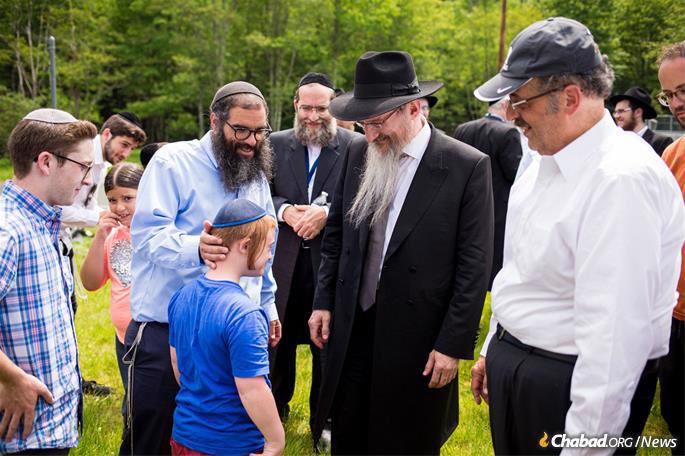The chief rabbi of Russia, Rabbi Berel Lazar, took time out of his visit to the United States earlier this week to visit a Jewish summer camp for individuals with special needs, and physical or intellectual disabilities. The visit came as the chief rabbi was in New York to observe Gimmel Tammuz, the 25th anniversary of the passing of the Rebbe—Rabbi Menachem M. Schneerson, of righteous memory.
The atmosphere at the seven-week sleepaway camp is very much on target with the teachings of the Lubavitcher Rebbe, stated Rabbi Judah Mischel, executive director of Camp HASC. “The ahavas Yisroel [‘love of a fellow Jew’] here is magnetic; it pulls you in. And the way people relate to each other puts everyone on a level playing field.
“When Rabbi Lazar was here, we were talking about it,” said Mischel. “This is everything you learn in theory, and what the Lubavitcher Rebbe talked about is manifestated here in the way people relate to each other and take care of one another.”
Lazar’s visit followed a Gimmel Tammuz farbrengen Camp HASC held the day before.
“The Rebbe was the most significant leader of the Jewish people in modern times,” said Mischel to Chabad.org. “He wasn’t the Rebbe only for Chabad-Lubavitch, but a leader of the generation and his life and lessons apply to everyone in the Jewish community and all of humanity.”
Visiting a Camper From Moscow
Lazar was helicoptered onto the grounds of Camp HASC in Upstate New York on July 7 to learn more about the facilities, as well as visit a boy from Moscow who is spending his summer there.

Lazar toured the camp’s medical facilities, the therapy rooms, some of the recreational areas and even offered a few words of blessing. Noting that there is a reward for people who help children with special needs and bring them closer to G‑d, Lazar told the camp staff that they should be blessed.
“For us, it was a big honor and very special,” said Mischel. “We were all surprised by how natural and comfortable Rabbi Lazar was with everybody. It was really something.
“Rabbi Lazar’s mesiras nefesh and ahavas Yisroel was very natural. People were just drawn to him. They wanted to talk to him, and he spent a lot of time with people,” related Mischel. “It was very cool.”
Mischel said “everything the Rebbe represented, and his social vision for the world—his values, his theology—is something for everyone to learn from. And in Camp HASC, where you have a self-selected staff of people who are doing for others, there is no more obvious focus of a staff program than to talk about the Rebbe on his yahrtzeit.”











Start a Discussion